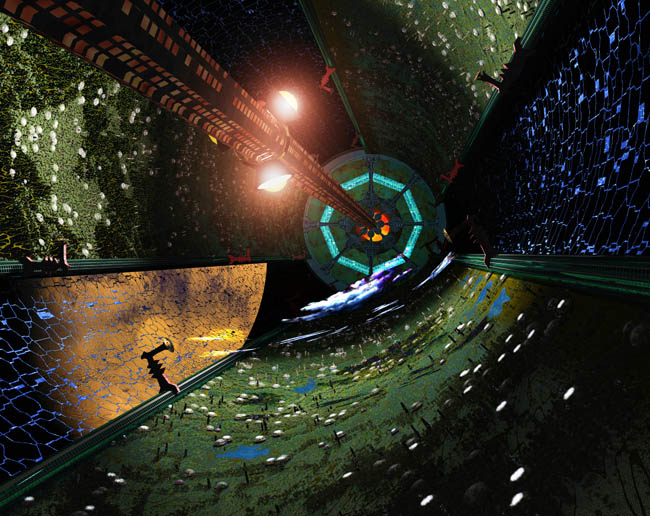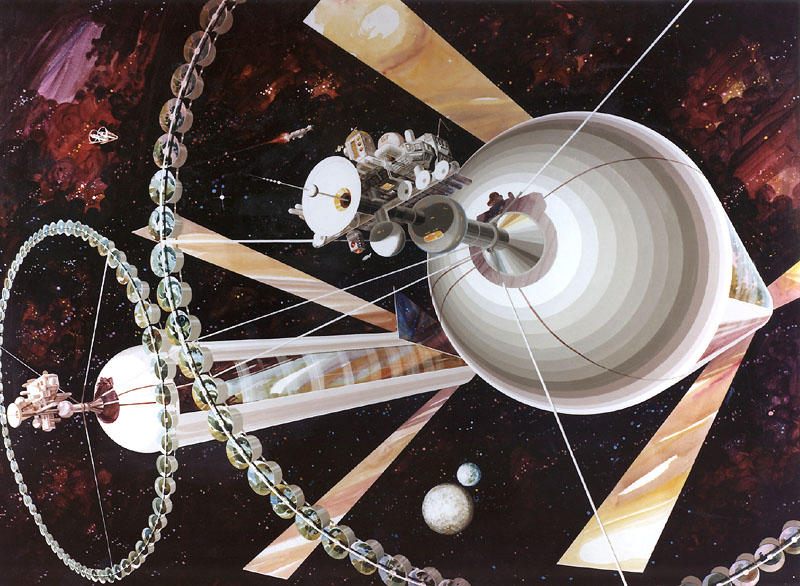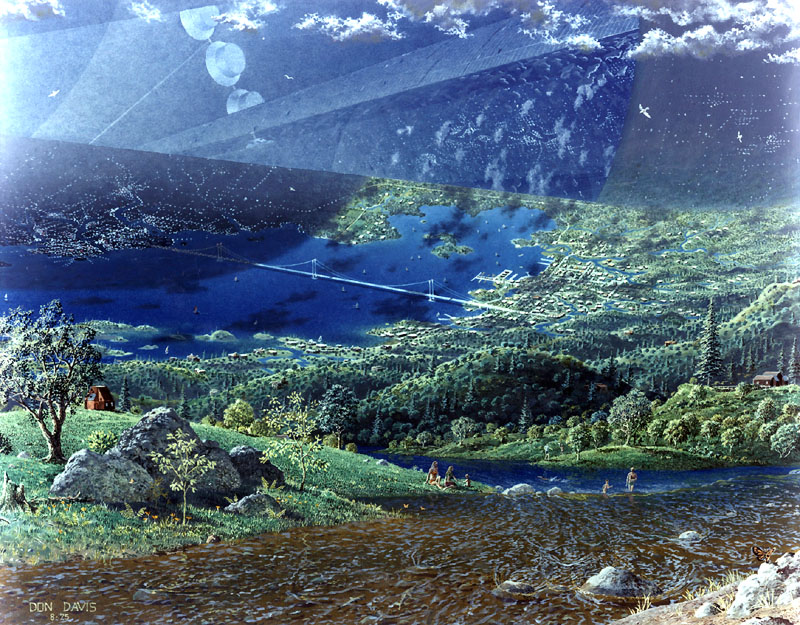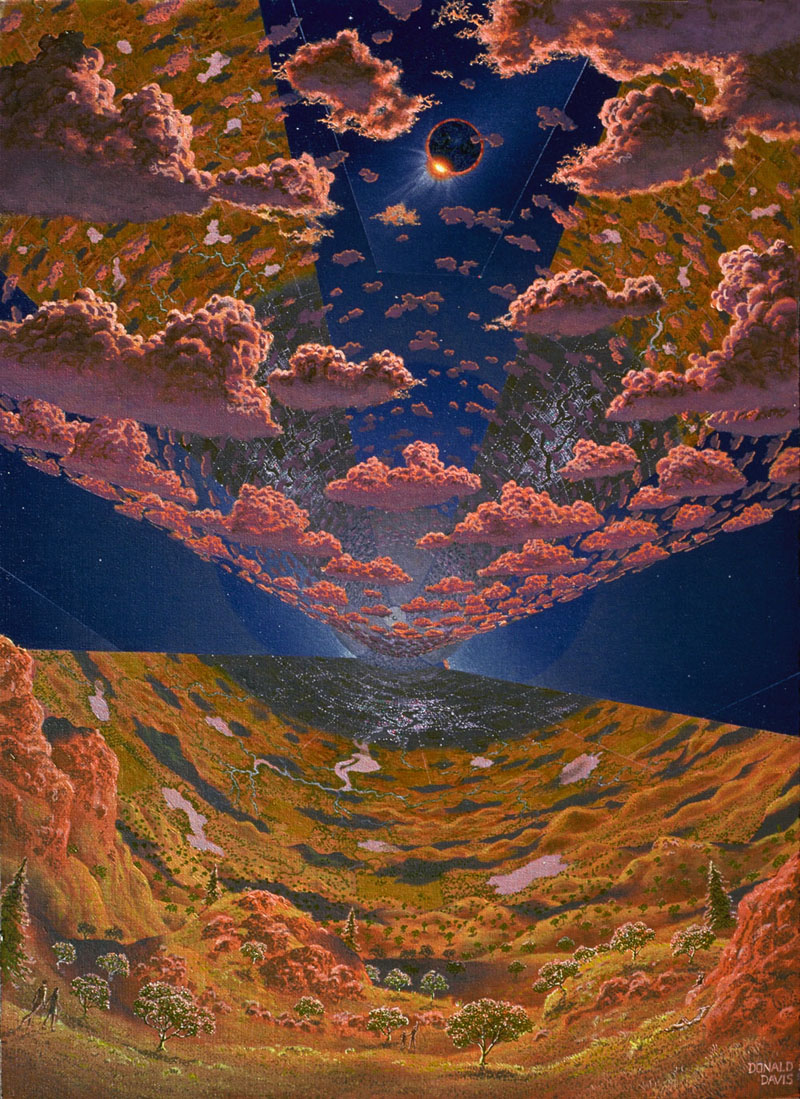O'Neill Cylinder interior provides a 20-mile vista. Children born here would think it totally normal to have "upside down" land areas overhead. Painting by Rick Guidice courtesy of NASA.
Even if we survive extinction, our history might not be preserved

Evidence suggests all Mayan cities were abandoned around the tenth century, including Chichen Itza.
The abandonment of Mayan cities has not yet been fully explained, but there is some evidence of prolonged drought and even problems due to deforestation. The Mayans returned to and resettled their cities around 1000 AD. But much of the knowledge of astronomy and history was lost. Some even believed the gods must have built the pyramids.
Now, imagine if in two-hundred years humanity has to abandon Earth and leave on a space colony to search for life on a new planet? Humanity, like the Mayans, would eventually forget its history, even if an attempt were made to preserve it. And the humans we send out won't be coming back.

O'Neill Style Cylinder Colony Orbiting Mars © by Goetz Scheuermann
The initial pioneers won't make it
None of the estimated 3 to 10 million people leaving on a space ark similar to an O'Neil Cylinder would arrive at the destination — only their children, grandchildren and other descendants would be alive by the time the ark could reach a new home. These people would be born in space on a giant rotating space colony. None would ever experience Earth.
In an O'Neil Cylinder or other rotating structure, gravity would be a simulation, meaning the higher you climb towards the center, the less you'd weigh. Understanding how people on Earth could walk on a sphere would be unintuitive. Maybe, after several generations in space, people just wouldn't believe the whole "we came from Earth" story. Even with photographs and videos.

Earth would be mythical, like Atlantis
Maybe no one would truly believe that their great-great grandparents had built the space cylinder, on the mythical Earth paradise. It would all sound far-fetched, much like how Atlantis was technologically advanced, but unfortunately is nowhere to be found. Videos of Earth might seem like an incredible fantasy to keep the myth alive.
It would be impossible to imagine the abundance of ressources the mythical Earth must have had to organise and build what is the only home the space travellers have ever known or could ever imagine. It would seem like only some unknown far-more powerful people — or gods — could have built the ark they call home.

O'Neill Cylinder exterior. The modules on the large ring structure around the endcap are used for agriculture. Each module's environment could be suited to a different food. Painting by Rick Guidice courtesy of NASA.
Massive building projects would be unknown
For the Mayans, when the powerful rulers fell and the agrarian people returned to the jungle to form small villages of hunter-gathers, the knowledge of the pyramid builders was lost. Even though the survivors returned to live in the ruined cities.
We ruined Earth, but we can survive in space?
If future space travellers living in an O'Neil Cylinder manage to survive by recycling everything on board (as would be required), they might not believe the builders of the space cylinder (the epitome of a sustainable environment) were the same who fled the Earth they poisoned.

O'Neill Cylinder endcap. The artist's inspiration came after O'Neill suggested to him that the view of San Francisco and the Golden Gate Bridge from Sausalito would provide an excellent scale reference for a later model cylindrical colony. Painting by Don Davis courtesy of NASA.
A new religion
Eventually, a charismatic space traveller might form a type of religion after receiving a message "from the gods": history is a lie, there is no Earth, and a powerful god (or fellow space-travelling civilisation) built the space station. It might make just as much sense as the so-called Earth.

O'Neill Cylinder vista with ruddy hues caused by a solar eclipse (which would be more common at L5 than on Earth but still infrequent). The cylinders are large enough to have weather, which could even be made to change with the seasons, perhaps depending on a colonist vote. Painting by Don Davis courtesy of NASA.
There is no Internet in deep space
On the space station there will be no Internet as we know it, because all the servers and satellites need the Earth, but also because the Internet needs millions of people participating. It is our collective brain. On the space cylinder there are only 3 to 10 million humans from Earth, probably from various cultures and countries whose only job is survival. They are the descendants of Earthlings sent on the most important survival mission in the history of humanity. They will probably split into factions and might be more concerned with keeping the peace than making sure everyone is taught the same history. If the Space-Ark God religion takes hold, who will keep the "mythical" Earth story alive?
**In his 1973 science fiction novel Rendezvous with Rama, Arthur C. Clarke provides a vivid description of a rotating cylindrical spaceship that is about 50% larger than the classic 20-mile long O'Neill Cylinder. Artist Eric Bruneton has created this striking 3D animation of Rama.**
History, or the lesson of history?
What happens when ancient history is lost? As time goes by, it becomes harder to prove, especially when people settle on the story they want to believe. Currently, most scholars believe the Greeks and Egyptians founded civilization, with the Sumerians before them. Even when there is evidence for a much more ancient worldwide civilization at sites such as Göbekli Tepe in Turkey. There is good evidence the Sphinx in Egypt is far older than we are taught. But the evidence doesn't fit the story we tell ourselves, which is "there couldn't be an older civilization without writing". And yet there was. The Celts, the builders of Stonehenge...
But on a space ark, it's a losing battle. With so few people left to investigate, and no chance to make archeological surveys, history will be reduced to stories without evidence. My religion versus yours. At some point, we'll just have to let it go. Let people form their own ideas. No one will remain to teach the truth, which they might not believe anyway. All species live relatively in the moment and deal with the problems of their lifetimes. Asking "where did we come from" is a luxury for those who have the time, curiosity and security to ponder. The focus of a space colony must be on sustainability and survival. After all, these are the lessons we would learn from knowing the truth: we left Earth because we poisoned our environment. Even if no one believes it literally, the myth will be a powerful cautionary tale. Some may even begin to believe Earth was real.
The O'Neill Cylinder was designed by Princeton physicist Gerard K. O'Neill
O'Neil Cylinder, space colonies